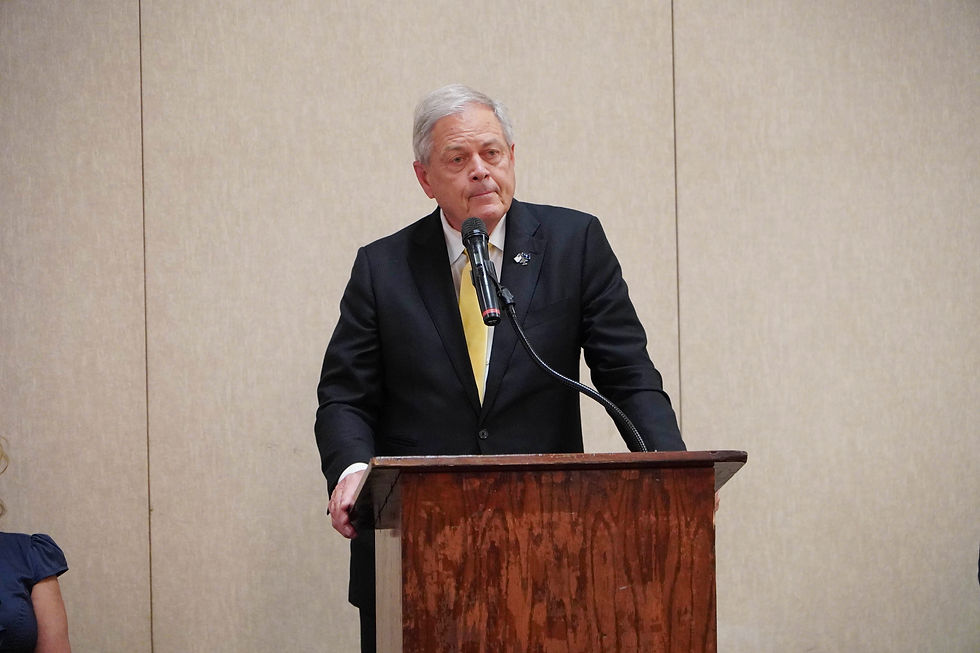The Cartel in Columbia: How Victims, Lawmakers, and Prosecutors Exposed a Broken System
- CUBNSC

- Nov 16, 2025
- 5 min read

By Javar Juarez | CUBNSC | November 16, 2025
COLUMBIA, S.C. — Two declared GOP candidates for governor — Attorney General Alan Wilson and U.S. Rep. Ralph Norman — shared a stage with two candidates for attorney general — First Circuit Solicitor David Pascoe and Eighth Circuit Solicitor David Stumbo — for a town hall focused on one thing: shifting control of judicial selection away from lawyer‑legislators and into the executive branch. The host, Rep. Joe White (R‑Newberry), is advancing H.4516 to move the Judicial Merit Selection Commission (JMSC) under the governor, ban legislators from serving on it, and term‑limit commissioners. The lineup and the proposals make this more than a policy forum; the next governor would wield the new appointment power — and two people on the stage want that job.

This was not a bipartisan event — the speakers and elected on stage were Republicans — but they framed the issue as nonpartisan and structural: South Carolina’s judiciary, they argued, is effectively controlled by a small circle of lawyer‑legislators who screen and elect the judges before whom they also practice. Wilson called the fight “a right versus wrong issue,” while Pascoe labeled the current setup “madness,” saying judges inevitably “look over [their] shoulder” when lawyer‑legislators appear before them.
The core asks from the stage: put JMSC inside the executive branch (so voters can hire or fire the official responsible for vetting nominees), keep the legislature’s up‑or‑down vote on judges, and consider mid‑term retention votes for judges who ignore statute or canons.
Stumbo went further, urging a federal‑style model (governor nominates one, legislature confirms) as the long‑term fix via constitutional amendment.

Speakers pointed to real‑world consequences of insider control: opaque orders, slow‑walked cases, and victims sidelined. They repeatedly cited the Jeriod (Jeroid) Price episode — a sealed order that cut a murder sentence and freed Price without public hearing or victim notification — later vacated by the South Carolina Supreme Court after the Attorney General’s office intervened. The Court faulted both the solicitor and the retired judge for bypassing required procedures; the defense lawyer in the case was Rep. Todd Rutherford, and the prosecuting office was led by Fifth Circuit Solicitor Byron Gipson.
Why this matters now: If H.4516 (or a similar bill) passes, the next governor would direct the judge‑screening machinery — a live 2026 campaign issue given Wilson’s and Norman’s bids. “Right now,” Wilson said, the executive is at the “kids’ table” while the legislature screens and elects judges; moving JMSC would “shift accountability” to a single statewide official voters can hold responsible.
Voices of the Families

Lori Williams — sister of Lt. Larry Vaughn (Rock Hill PD)
Williams said her brother’s accused killer secured a $250,000 bond and remained free for two and a half years after a lawyer‑legislator joined the defense. She described repeated delays tied to legislative immunity and a four years, one month, 11 days wait for trial. “Our system has to change,” she told the room, adding, “you have no idea how broken the system is until you have boots on the ground.”

Shannon Nicole — family court survivor and mother
Nicole recounted an “ambush hearing”: opposing counsel (a would‑be judge) alleged “parental alienation,” after which she says the judge ordered her to vacate her home that day with only a backpack, gave her ex control of marital funds, and threatened jail if she didn’t quickly pay guardian ad litem fees. “This is pay‑for‑play… cash for kids… a profit‑driven system,” she said.
Carl Stoller — father of Dallas Hayes Stoller (statement read by Rep. Joe White)
Stoller alleged that while represented by Sen. Brad Hutto, the defendant in his daughter’s case re‑offended within 45 days of bond and later benefited from back‑door plea deals that left victims out until decisions were made. He urged reforms to let victims speak before pleas are struck: “Why do we continue to support a system that appears corrupt?”
Stephen Federico — father of Logan Haley Federico
Federico said his daughter was murdered by a “career criminal” with 39 arrests and 25 felonies who served 411 days of a five‑year sentence in a prior case and kept “roam[ing] the streets.” He vowed to push for a national registry for violent felons and pressed for judges who “can’t run rogue.” “I’m not going anywhere,” he said.

The Smalls family — the Jeriod Price sealed‑order release
Solicitor David Pascoe described how Carl and Lily Smalls learned via an automated DOC call that their son’s convicted murderer, Jeriod Price, was being released under a sealed order signed in chambers without a public hearing or victim notification. Pascoe said he contacted the family, then the AG’s office; Attorney General Alan Wilson moved to take the matter to the S.C. Supreme Court, which reversed the release. Pascoe added that press scrutiny later uncovered other sealed releases.
What their stories have in common: delays and preferential treatment when lawyer‑legislators are involved; sealed or opaque orders that shut out victims; and, in family court, proceedings that can upend lives without a jury or meaningful accountability. Those patterns are the connective tissue behind the push to move JMSC into the executive branch, bar legislators from serving on it, and tighten transparency/notification rules so victims are heard before decisions are made.
For years, many Black victims’ families and advocates have voiced the same warnings about secrecy and favoritism. Saturday’s largely white, conservative lineup pushed those arguments into the GOP’s 2026 conversation — potentially changing their political traction. Pascoe underscored that the stakes “don’t depend on color or party”: “African Americans, whites — it doesn’t matter … victims and defendants need a stronger voice.”
Note: All quotations and time spans above are taken verbatim or closely paraphrased from the Seawell’s town hall recordings and our follow‑up interview; CUBN will continue to seek comment from those named.



Comments